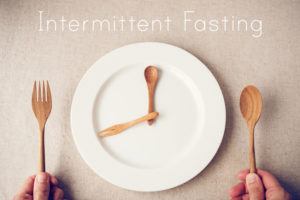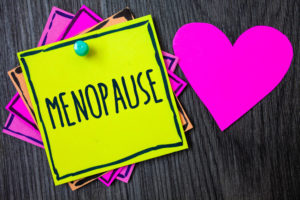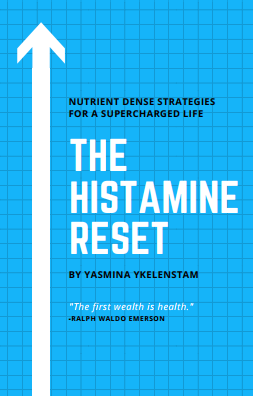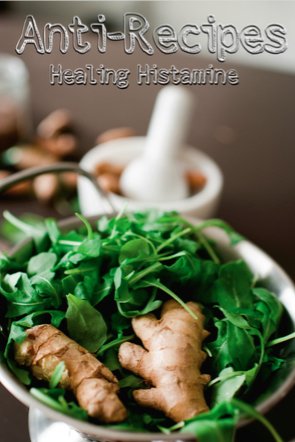
It’s hardly news to us those of us with histamine intolerance and mast cell activation that inflammation can cause symptoms of anxiety. Now though, the research has finally caught up, with scientists identifying altered pro and anti-inflammatory profiles in patients with Generalised Anxiety Disorder (GAD). One of the inflammatory agents is monitored in the study can also be released by mast cells (which can also trigger histamine).
The study published in Brain, Behavior and Immunity provides the first evidence that Generalized Anxiety Disorder (GAD) is associated with an imbalance between interferon (IFN-y), interleukin (IL-10), and tumor necrosis factor (TNF-a), which is released by mast cells.

The authors found that patients with GAD had high levels of pro-inflammatory IFN-y and TNF-a, but low levels of the anti-inflammatory IL-10, compared to healthy control subjects. They believe that an impairment of the tryptophan degrading enzyme leads to degradation of serotonin in patients with GAD.
I’ve long researched the link between histamine, mast cells and anxiety and depression.
You can read about the mast cell-depression link here
And how antihistamines can treat schizophrenia here
HISTAMINE IS ALREADY IN THE BRAIN
Now, with histamine researcher Dr. Janice Joneja once said to me, “Well of course the symptoms are all in the head, histamine is a neurotransmitter!”
You can find my interview with this amazing histamine researcher here
Her comment tickled me immensely given the number of times I was admonished for imagining my symptoms and that it was ridiculous to link what I ate, and how my body felt, to my state of mind.
Read all about how histamine can generate symptoms of anxiety here
It seems that us members of the “permanently inflamed tribe” have been vindicated in linking flushing, palpitations, anxiety, tunnel vision and (in my case) a sense of doom almost like an asteroid was on a collision course with my reality, to histamine and inflammation generally.
I was first diagnosed with anxiety at about fourteen years old, but really I’d been suffering from it since childhood. My brother once commented (ok, way more than once), that I was the most fearful and stressed child he’d known (he’s sixteen years older than me). While it’s true that I’ve had a very tumultuous life, growing up in a war zone, father dead at 40 or so, changing schools and moving country every six months at times, I don’t consider that I had a particularly traumatic life compared with many people. And yet I was shaking like a leaf most days, filled with a sense that something truly catastrophic was about to befall me or my loved ones. I would wake up in the morning with a sense of dread, wondering what awful thing was going to happen. It was almost a relief when something would happen, and hopefully I could go about the rest of my day just a smidge less fearful than I started it.
But things got out of hand at university. Within just a few short years I was diagnosed with GAD, bipolar and unipolar depression, borderline personality and was medicated with pretty much everything on the market, for years. Changing my diet allowed me to come off all psychiatric medications (including daily Xanax/benzodiazepines), within a matter of months, but I was still a mess histamine-wise, till I totally overhauled my life.
Nowadays it takes a major life event to properly phase me. What I’m still not great at is dealing with daily anxiety due to a situation beyond my control, like when my mother fell ill last year and I spent a year flying back and forth to a country on another continent.
But I do my best. The meditation and exercise are a huge help, as is knowing that I may be on edge simply because my histamine level might be elevated. And yes, it does still happen to me. Because like you, I’m human, and I’m constantly pushing the boundaries to see what I can get away with.
You’ll find recipes full of foods with antihistamine and anti-inflammatory properties my books Anti-Recipes and The Anti-Cookbook
CLICK HERE FOR A FOUR WEEK HISTAMINE RESET WITH MEAL PLANNERS, STRESS RELIEF STRATEGIES & MORE
——–REFERENCES——–
Brain Behav Immun. 2017 Feb 1. pii: S0889-1591(17)30021-1. doi: 10.1016/j.bbi.2017.01.021. [Epub ahead of print]
Peripheral inflammatory cytokines and immune balance in Generalised Anxiety Disorder: Case-controlled study.
Hou R1, Garner M2, Holmes C3, Osmond C4, Teeling J5, Lau L3, Baldwin DS6.













